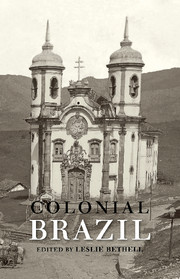Book contents
- Frontmatter
- Contents
- List of maps and figures
- Note on currency and measurement
- Preface
- 1 Portuguese settlement, 1500–1580
- 2 Political and economic structures of empire, 1580–1750
- 3 Plantations and peripheries, c. 1580 – c. 1750
- 4 Indians and the frontier
- 5 The gold cycle, c. 1690–1750
- 6 Imperial re-organization, 1750–1808
- 7 Late colonial Brazil, 1750–1808
- A note on literature and intellectual life
- Bibliographical essays
- Index
1 - Portuguese settlement, 1500–1580
Published online by Cambridge University Press: 05 June 2012
- Frontmatter
- Contents
- List of maps and figures
- Note on currency and measurement
- Preface
- 1 Portuguese settlement, 1500–1580
- 2 Political and economic structures of empire, 1580–1750
- 3 Plantations and peripheries, c. 1580 – c. 1750
- 4 Indians and the frontier
- 5 The gold cycle, c. 1690–1750
- 6 Imperial re-organization, 1750–1808
- 7 Late colonial Brazil, 1750–1808
- A note on literature and intellectual life
- Bibliographical essays
- Index
Summary
Late medieval Europe had long been linked with Asia via tenuous land routes, as had Asia with America across the Pacific, but it was not until the Portuguese thrust into the Atlantic early in the fifteenth century that the last great oceanic hiatus in global intercommunication came to be closed. Paradoxically, this first stirring of what was to become modern European imperialism emerged from a society in contraction. Portugal, like the rest of Europe, had suffered a severe population decline in the middle years of the fourteenth century; the ensuing abandonment of marginal land along with the depopulation of towns and villages had created a classic ‘feudal crisis’ with the upper strata of society economically squeezed by the loss of much of their customary revenue. Elsewhere in Europe this pinch had the effect of sending forth members of the nobility on marauding expeditions in search of booty and new sources of income; the Portuguese conquest of the Moroccan seaport of Ceuta in 1415 (the same year as Henry V's victory at Agincourt) may well be viewed in this light. But Ceuta and the accompanying vision of a North African empire that it suggested turned out to be a dead end. It proved impossible to renew the peninsular reconquest in Morocco: the Berber population was too resistant, too deeply attached to its Islamic beliefs; Portugal's population was too small, its military resources too few.
Instead, the Portuguese thrust was deflected westward, onto the sea and down the coast of Africa.
Information
- Type
- Chapter
- Information
- Colonial Brazil , pp. 1 - 38Publisher: Cambridge University PressPrint publication year: 1987
Accessibility standard: Unknown
- 13
- Cited by
